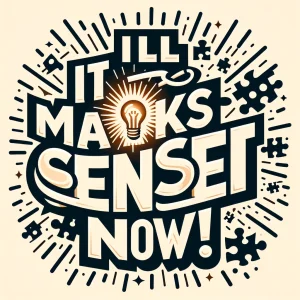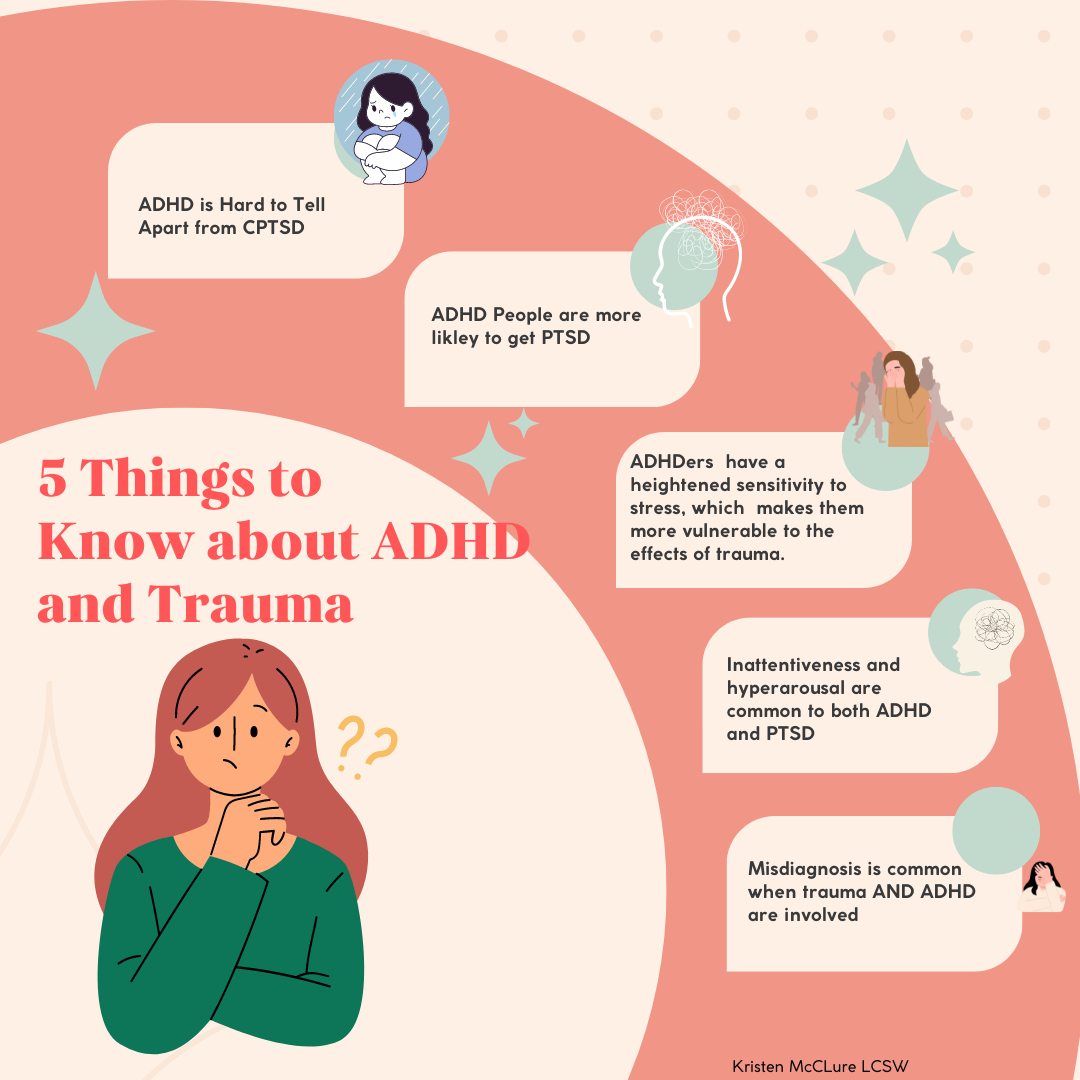
🌟 ADHD and Anxiety: Understanding the Overlap and Effective Coping Strategies 🌟
🌟 ADHD and Anxiety: Understanding the Overlap and Coping Strategies 🌟
🗝️ TL;DR Key Points:
- Who’s at Risk for Both?
- 👩 Women: Often undiagnosed or misdiagnosed, leading to anxiety.
- 🧩 Autistic People: High rates of both
- 🧒 Children: Particularly those with learning disabilities or ODD.
- Impact of Anxiety on ADHD: 🔄 Anxiety can worsen ADHD symptoms, creating a vicious cycle of 🧠 Inattention and 😟 Worry. ADHD worsens anxiety as well.
- Neurodivergent Anxiety: Neurodivergent individuals face unique stressors like 🌟 Sensory Overload, 🗣️ Social Communication Challenges, and 🧩 Executive Functioning Difficulties, leading to a distinct form of anxiety not researched or accounted for.
- Coping Strategies: 🧘♂️ Breathwork, 🧠 Cognitive Strategies, 🪴 Grounding Techniques, and 📅 Executive Functioning Support are effective for managing neurodivergent anxiety, which comes from feeling unsupported in the world due to one's differences.
🟧 Conclusion:
Deeply intertwined and Neurodivergent-affirming practices that include and understand your nervous system are necessary.

ADHD and Anxiety in Women: Why Do They Overlap?
If you identify as a woman, the intersection of ADHD and anxiety might be especially complex for you. Are you often juggling feelings of restlessness, racing thoughts, and the inability to focus? Women with ADHD are frequently diagnosed later in life, and the challenges of living in a world unaccommodated to neurodivergent traits can trigger anxiety. In many cases, these overlapping conditions aren't just coincidental—they are deeply connected by both genetic and environmental factors.
Living with ADHD in a world that expects linear thinking, focus, and organization can be exhausting. Constantly trying to adapt to systems not designed for you can lead to chronic stress. Over time, this stress can fuel anxiety, leaving you feeling trapped in a cycle of worry, inattention, and frustration. Additionally, research suggests that ADHD and anxiety may share genetic roots, meaning that you might be predisposed to both conditions due to overlapping biological factors. Combine this with societal pressures and unmet needs, and it’s easy to see why ADHD and anxiety often coexist in women.
Common Symptoms of ADHD and Anxiety
ADHD and anxiety share several key symptoms, making it difficult to untangle one from the other. Here are the most common overlapping signs:
- Inattention: Struggling to concentrate, feeling distracted, or unable to follow through on tasks is common in both ADHD and anxiety. While ADHD causes general distractibility, anxiety-driven inattention stems from worries that occupy mental space.
- Restlessness and Agitation: Feeling "on edge," fidgeting, or an inability to sit still can be traced back to both conditions. With ADHD, restlessness might come from hyperactivity; with anxiety, it often manifests as a response to underlying fears or stress.
- Irritability: It’s easy to feel irritable when you’re constantly battling to focus or trying to suppress anxious thoughts. Both ADHD and anxiety contribute to this heightened emotional state.
- Mood Instability: Emotional regulation can be tough for anyone, but especially so when ADHD and anxiety collide. Sudden mood changes, whether sparked by frustration or anxious rumination, often blur the line between these conditions.
- Sleep Disturbances: Trouble falling or staying asleep is another shared struggle. For those with anxiety, racing thoughts may keep them awake, while ADHD can cause hyperactivity or impulsivity that disrupts sleep.
Unique Symptoms of ADHD and Anxiety
While ADHD and anxiety have significant overlap, some symptoms are more characteristic of one condition over the other.
Symptoms Unique to ADHD:
- Hyperactivity: Difficulty sitting still, constant movement, and excessive talking may be key indicators of ADHD. This physical restlessness isn’t typically seen in anxiety alone.
- Impulsivity: Acting without thinking, interrupting conversations, or making snap decisions are trademarks of ADHD. Anxiety doesn’t typically cause this kind of impulsivity.
- Executive Functioning Deficits: Challenges with organization, time management, and completing tasks are central to ADHD. Anxiety can affect executive functioning too, but it’s not the root cause.
Symptoms Unique to Anxiety:
- Excessive Worry: Anxiety is characterized by constant, uncontrollable worry about future events or everyday situations, which isn’t necessarily a hallmark of ADHD.
- Physical Symptoms: Muscle tension, sweating, heart palpitations, and even panic attacks are signs of anxiety, not ADHD.
- Avoidance Behavior: People with anxiety may avoid situations that trigger their fears, such as social gatherings or public speaking. In ADHD, avoidance tends to come from boredom or difficulties with tasks, rather than fear.
The Challenge of Telling Them Apart
So, how can you tell if your struggles are rooted in ADHD, anxiety, or both? The truth is, it’s often tricky to separate the two. Shared symptoms like inattention and restlessness make diagnosis a challenge, and the subjective experiences of both conditions can blur the lines even further.
Women are especially vulnerable to being misdiagnosed with anxiety alone, while their underlying ADHD goes unnoticed. In many cases, anxiety in women is treated without addressing the root cause—unsupported ADHD symptoms. This can lead to frustration and feelings of being misunderstood by healthcare providers.
If you feel like you’re constantly caught in a loop of worry, inattention, and irritability, it might be worth exploring the possibility that ADHD and anxiety are both at play.
Treatment Options for ADHD and Anxiety
When ADHD and anxiety co-occur, treatment often requires a tailored approach. The first step is typically addressing the condition that’s causing the most distress, though this can vary from person to person.
- Stimulant Medications (e.g., Methylphenidate or Amphetamines): These are commonly prescribed for ADHD and can also reduce anxiety symptoms in some individuals. However, stimulants might increase anxiety in others, so close monitoring is important.
- Non-Stimulant Medications (e.g., Atomoxetine): Atomoxetine has been shown to be effective for ADHD and may help with anxiety, though more research is needed to confirm its effectiveness for everyone.
- Antidepressants (e.g., SSRIs): Selective serotonin reuptake inhibitors (SSRIs) are often used to treat anxiety and can be combined with ADHD medications for individuals who experience both conditions.
- Cognitive Behavioral Therapy (CBT): CBT is a common therapy for anxiety, but it can be less effective for individuals with ADHD if not adapted to their unique needs. ADHD-specific strategies for emotional regulation and time management can also be integrated into therapy.
- Combination Therapy: For some, a mix of ADHD medication and therapy for anxiety can provide the most relief. A personalized treatment plan that accounts for both conditions is crucial to improving quality of life.
Facts about Anxiety in ADHD women
-
- 1. High Comorbidity In Women
- Women with ADHD are significantly more likely to experience anxiety disorders compared to those without ADHD. Research shows that 34-50% of women with ADHD have a co-occurring anxiety disorder, a much higher rate than in the general population. This comorbidity is more prevalent in women than in men with ADHD.
2. Delayed ADHD Diagnosis Increases Anxiety Risk
- Women are often diagnosed with ADHD later in life, partly due to differences in how ADHD presents in females (e.g., inattentive symptoms rather than hyperactivity). The delayed diagnosis or misdiagnosis can lead to higher rates of anxiety, as undiagnosed ADHD symptoms contribute to stress, overwhelm, and difficulty coping with daily responsibilities.
3. Inattentive ADHD and Anxiety
- Inattention, a common ADHD symptom, is strongly linked to anxiety in women. Women with inattentive ADHD tend to overthink and ruminate on their difficulties with focus, organization, and time management, which can increase feelings of anxiety and stress.
4. Hormonal Fluctuations Worsen Anxiety
- Hormonal changes during menstrual cycles, pregnancy, and menopause can exacerbate both ADHD and anxiety symptoms in women. For instance, women with ADHD often report increased anxiety during the luteal phase of the menstrual cycle (the week before menstruation), when estrogen levels drop, worsening emotional regulation.
5. Anxiety Compounds Executive Function Challenges
- Anxiety can further impair executive function, which is already a key difficulty in women with ADHD. This leads to a cycle where anxiety increases ADHD-related struggles with organization, time management, and memory, which in turn heightens anxiety. This feedback loop makes it difficult for women to manage both conditions without targeted interventions.
- 1. High Comorbidity In Women
A Note on Neurodivergent Anxiety
It’s essential to remember that traditional anxiety treatments don’t always apply to neurodivergent individuals. Neurodivergent anxiety, which often stems from living in an environment that doesn’t accommodate your brain’s natural wiring, can require different approaches. If you'd like to learn more about neurodivergent anxiety and how to address it in a way that works for you, check out this comprehensive guide.
Recognizing the unique challenges of ADHD and anxiety, particularly in women, is the first step toward finding effective support. Embracing your neurodivergence and seeking treatment that respects your individuality can help you navigate both conditions with greater ease.
More Resources
-
- Adhd and Generalized Anxiety Disorder
- Neurodivergent and Neurotypical Communication:
- ADHD and Social Anxiety: Empowering Women to Thrive
- Understanding ADHD Symptoms in Women: A Comprehensive Exploration
- How Adhd Fuels Generalized Anxiety Disorder
- ADHD and Burnout: Everything you Need to Know About Preventing and Healing It




